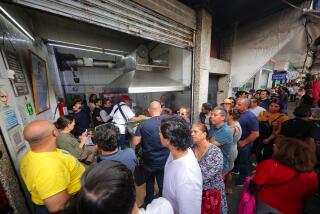Socialists Gain Edge in French Elections
The left has resumed its reconquest of large chunks of the French political landscape by outscoring center-right incumbents in the densely populated Paris and Marseilles areas in regional elections held over the weekend.
Before Sunday’s balloting, the Socialists and their Communist and ecologist allies, though in control of the Parliament and national government in Paris, held a majority in just two of mainland France’s 21 regional councils. When the votes were tallied, the left had pulled ahead in 11, though it won an outright majority in only one of those regions, rural Limousin.
The anti-immigrant, extremist National Front of Jean-Marie Le Pen pocketed 15.5% of the vote, a small improvement over its previous scores in nationwide elections. That was more than enough to deny either the left or the traditional right an absolute majority in many regions. In three regions, including the important Greater Lyons area known as Rhone-Alps, left and right were running neck and neck.
Hence, in regional councils from Lille to Marseilles, politicians were still jockeying more than 24 hours after polls closed to see who would be in charge. But in general, the left’s 39.6% of the overall vote was seen as proof of continued voter support nine months after Socialist Prime Minister Lionel Jospin’s government unexpectedly swept to power in early parliamentary elections.
The left’s showing is far from the landslide hoped for by Jospin’s lieutenants. But it should be enough to discourage center-right President Jacques Chirac, who blundered by calling the elections that Jospin and his allies won in June, from repeating the maneuver as early as this summer--as is the president’s constitutional prerogative--in hopes of more favorable results.
Although the neo-Gaullist Rally for the Republic and more centrist Union for French Democracy repeatedly spurned formal alliances with Le Pen during the campaign, on Monday evening the far-right leader offered his party’s backing to mainstream conservative candidates who will endorse some planks of the National Front’s platform.
Already, politicians on the right in some regional councils--which were created 12 years ago to decentralize authority over education, economic development and other local concerns--have said that even if they won’t curry support from Le Pen, they won’t spurn votes from victorious National Front candidates either. That could allow the traditional right, which won 35.6% of the ballots cast, to retain more of the regional presidencies, which are supposed to be chosen Friday.
The risk, though, could lie in alienating a large share of the public, who view Le Pen as a threat to democratic traditions.
In the Marseilles region, known as Provence-Alps-Cote d’Azur, a slate led by Le Pen won as many council seats as the mainstream right but fewer than the Socialists and their allies. In the Paris region, Ile de France, the left narrowly beat out a center-right list topped by former Prime Minister Edouard Balladur.
Two out of every five eligible voters did not show up at the polls, for a record abstention rate explained in part by the newness of regional institutions and their still-modest powers. The citizenry will be called back to the ballot boxes Sunday to choose councils in the departements, or smaller administrative units.
More to Read
Start your day right
Sign up for Essential California for news, features and recommendations from the L.A. Times and beyond in your inbox six days a week.
You may occasionally receive promotional content from the Los Angeles Times.





